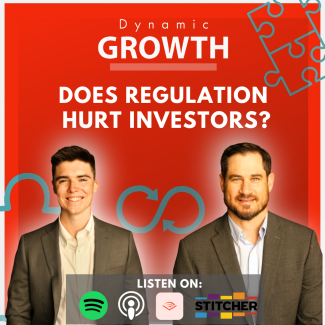
Does regulation hurt investors?
Is it about time we start believing what Jerome Powel is telling us?
Time and time again, Jerome Powel has stayed consistent in his message from the Fed. Taming inflation is their #1 objective – period. They will continue to do what is needed to make monetary policy restrictive enough that demand, and thus inflation is reduced. The Fed is closely watching unemployment and inflation and until the labor market shifts from its current relatively strong position, there is no indication they have over-tightened. We all keep waiting for a pivot but instead, the Fed remains steady with its message.
What’s driving the FED
Leading up to the November meeting, the Fed signaled a 75-basis point increase in November, then 50 in December, then maybe one smaller increase in 2023. Then they contradicted that thought process in the meeting. Jerome Powel announced that the terminal Fed funds rate is going to be above what investors are expecting (most are pricing in 4.75-4.5%) – it seems challenging but that’s their plan.
The Fed’s history with inflation has not always been a pleasant one:
- 1960s: inflation crept up due to war spending and the Fed went off the gold standard in ’71 (Bill Martin)
- 1973: the price of oil remained high even after oil embargo and from 1969-1979 prices rose 98% (Arthur Burns)
- 1980s: interest rates rose to 20% (remember that we are at 4% now) and unemployment was up to 10.8% to try and tame inflation (Paul Volcker)
Today, the Fed will continue to risk overtightening to try and make sure history doesn’t repeat itself. Until consumers start making decisions based on inflation it will be difficult to get back down to a manageable level. Demand has to slow down and people will have to stop spending at their current rates.
What we’re watching
JP Morgan is making large investments over the next few years (and by large we mean roughly $12B/year) to enhance the technology and processes for the rental property market. The rental income industry is a whopping $500B market annually where today roughly 78% of renters pay via a check or money order. Automating the current manual processes with a new platform can lead to greater accuracy and efficiency. Banks have operated with the same technology for years but new competitors (PayPal, Crypto, etc.) are driving new needs.
Does regulation hurt investors?
Let’s break down some key facts as background to answering this question. First, it’s important to remember two things: the market is a stronger force than the government regulating it. Second, financial regulatory bodies like FINRA or the SEC exist to protect consumers. The challenge is when anything becomes too big then it must justify its existence. Here are two examples of laws that we believe work against investors.
- By law, consumers must receive quarterly statements. While it’s good to be kept informed, the downside is that many people tend to make decisions based on these statements, and often a quarter is not enough time to draw any real conclusions. After all, even the best-performing stocks will have periods of volatility.
- Life insurance policyholders receive annual annuity statements. Along the same lines as our first example, when a policyholder receives more frequent updates, they tend to underperform in the long run. In fact, studies have been performed and found that people receiving annual statements (vs monthly, quarterly) tended to outperform the accounts that received statements more frequently.
The concept of risk tolerance has hurt the attainability of investor goals. Risk should not be quantified by volatility; it should be quantified by the likelihood an investor’s financial goal will be achieved. Portfolios should be allocated to accomplish a goal, not fall in line with a 10 quotations risk tolerance test. While investment regulation is necessary, we urge investors to always consider their long-term goals before making decisions. As always, educate yourself and stay the course.
Please note: This content is not a direct recommendation for investment. Investing involves risk including the potential loss of principal. Not all investments are suitable for all people. Crosby Advisory Group, LLC is a registered investment advisor in Ohio, Florida, and Texas.

